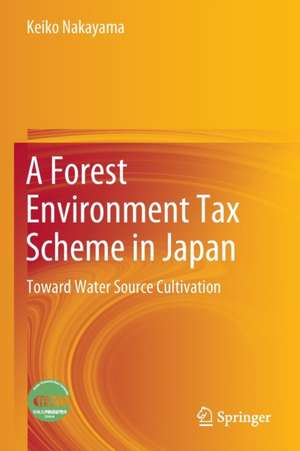A Forest Environment Tax Scheme in Japan: Toward Water Source Cultivation
Autor Keiko Nakayamaen Limba Engleză Paperback – 4 mar 2023
Forest conservation is an especially important policy issue for Japan, where two-thirds of the country is forested. InJapan, a forest environmental tax is being introduced as a forest conservation policy. As of 2021, the forest environmental tax has already been introduced in about two-thirds of the prefectures and soon will be introduced as a national tax. In this book, the significance and issues of the forest environmental tax will be sorted out, and the status of the introduction of the forest environmental tax in Japan will be compared with that of other countries. In addition, there is additional material regarding the water source conservation fund in Toyota City, Aichi Prefecture, a system similar to the forest environmental tax.
| Toate formatele și edițiile | Preț | Express |
|---|---|---|
| Paperback (1) | 689.14 lei 6-8 săpt. | |
| Springer Nature Singapore – 4 mar 2023 | 689.14 lei 6-8 săpt. | |
| Hardback (1) | 695.19 lei 6-8 săpt. | |
| Springer Nature Singapore – 3 mar 2022 | 695.19 lei 6-8 săpt. |
Preț: 689.14 lei
Preț vechi: 810.75 lei
-15% Nou
Puncte Express: 1034
Preț estimativ în valută:
131.86€ • 137.68$ • 109.14£
131.86€ • 137.68$ • 109.14£
Carte tipărită la comandă
Livrare economică 04-18 aprilie
Preluare comenzi: 021 569.72.76
Specificații
ISBN-13: 9789811693540
ISBN-10: 9811693544
Pagini: 126
Ilustrații: X, 126 p. 35 illus., 28 illus. in color.
Dimensiuni: 155 x 235 mm
Greutate: 0.2 kg
Ediția:1st ed. 2022
Editura: Springer Nature Singapore
Colecția Springer
Locul publicării:Singapore, Singapore
ISBN-10: 9811693544
Pagini: 126
Ilustrații: X, 126 p. 35 illus., 28 illus. in color.
Dimensiuni: 155 x 235 mm
Greutate: 0.2 kg
Ediția:1st ed. 2022
Editura: Springer Nature Singapore
Colecția Springer
Locul publicării:Singapore, Singapore
Cuprins
What Forest Environmental Tax is.- Forest Environmental Tax in Japan.- Tap Water Source Conservation Fund.- Forest Environmental Tax in Other Countries.- Optimization of Forest Environmental Tax.- Optimization of Water Source Conservation Fund.- Environmental Tax and Stackelberg Game.
Textul de pe ultima copertă
This book is a work that focuses on the forest environmental tax. Forest resources have played a major role in preventing global warming by absorbing carbon dioxide and supplying oxygen. However, global economic growth has adversely affected the global environment and has exacerbated global warming due to excessive consumption of forest resources. The functions or “services” of forests are diverse, but the interest of the citizenry in forest cultivation is scarce since forests are public goods. Concurrently, Japanese forestry, which has played an important role in forest conservation, is steadily declining, and it is no longer possible for private forest operators to maintain the forest environment. Therefore, in order to realize sustainable economic growth, it is necessary to formulate policies for the conservation of appropriate forest environments.
Forest conservation is an especially important policy issue for Japan, where two-thirds of the country is forested. In Japan, a forest environmental tax is being introduced as a forest conservation policy. As of 2021, the forest environmental tax has already been introduced in about two-thirds of the prefectures and soon will be introduced as a national tax. In this book, the significance and issues of the forest environmental tax will be sorted out, and the status of the introduction of the forest environmental tax in Japan will be compared with that of other countries. In addition, there is additional material regarding the water source conservation fund in Toyota City, Aichi Prefecture, a system similar to the forest environmental tax.
Forest conservation is an especially important policy issue for Japan, where two-thirds of the country is forested. In Japan, a forest environmental tax is being introduced as a forest conservation policy. As of 2021, the forest environmental tax has already been introduced in about two-thirds of the prefectures and soon will be introduced as a national tax. In this book, the significance and issues of the forest environmental tax will be sorted out, and the status of the introduction of the forest environmental tax in Japan will be compared with that of other countries. In addition, there is additional material regarding the water source conservation fund in Toyota City, Aichi Prefecture, a system similar to the forest environmental tax.
Caracteristici
Introduces examples of the forest environmental tax in Japan and other countries in a systematic manner Analyzes the optimization of the forest environmental tax from a theoretical perspective Mentions the water source conservation fund as being for the same purpose as the forest environmental tax
